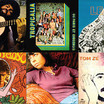Ilumencarnados seres
Três trópicos da tropicália
glauber rocha’s new cinema
By that time Glauber was already on his way to becoming a leading cultural figure While still living in Bahia he had already impressed European directors and critics; and Barravento was followed by Black God, White Devil, a film full of wild beauty that excited us with the prospect of achieving a great national cinema. This greatness was not a question of technical competency such had already been the objective at Vera Cruz, a highly organized studio that produced well-made films through the mid-fifties. The São Paulo entrepreneur Franco Zapari had Invited Alberto Cavalcanti a Brazilian filmmaker who had enjoyed success in England and France to answer the call of the Brazilian elite to return and create a film industry of high quality. Theirs was an attempt to overcome the primitive state of Brazilian commercial cinema, represented by the Carnivalesque comedies from Rio known as chanchadas, a successful formula Introduced In the thirties.
The victory of the movement about these two tendencies wasn’t reached without difficult, and we can’t say that the lack of attention – almost hostility – in productions as O cangaceiro (Vera Cruz) or O Homem do Sputnik (chanchada) don’t appear today as a injustice.
The Cinema Novo movement that emerged in the early sixties-of which Glauber was always the leader in both theory and practice-was as much opposed to the conventionality of the more respecable films coming out of Vera Cruz as to the crudeness of the chanchadas. Glauber’s Revisão Crítica do Cinema Brasileiro (Critical Revision of Brazilian Cinema) advocated a cinema born of Brazilian poverty in the same way that neo-realism had been born of the destitution of Italian cities immediately after the war. A call to arms for the young intellectual of the Left, Glauber’s revisão inspired their interest in cinema and drew their attention to films such as Rio, 40 Degrees by Nelson Pereira dos Santos, perhaps Brazil’s most influential filmmaker; it was as much a rejection off the sensible people shooting reasonable scripts as it was of the hucksters selling entertainment to a semi-illiterate moviegoing public.
Mais:
- » become a tropicalist
- » concretes
- » glauber rocha’s new cinema
- » goals of the movement
- » modernisms of 22
- » nara’s lindonéia
- » origins
- » talking to zé celso
- » the creative energies
- » the mpb on tv
- » the name
- » the night of “alegria, alegria”
- » baby
- » black music
- » caymmi
- » janis
- » joão gilberto
- » música popular nos anos 60
- » oswald no oficina
- » stones, beatles e dylan
- » terra em transe






















